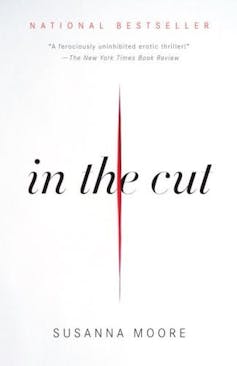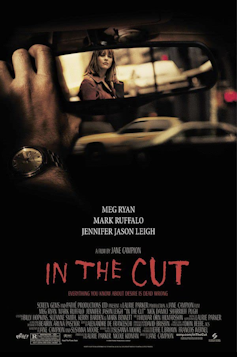My favourite detective: In the Cut's Frannie Thorstin and her fatal attractions
- Written by Sally Breen, Senior Lecturer in Writing and Publishing, Griffith University
In this series, writers pay tribute to fictional detectives on the page and on screen.
Frannie Thorstin, the narrator of Susanna Moore’s neo-noir novel In The Cut (1995) is a collector of urban slang. A divorced English professor living alone, she is writing a book on dialects. So, the novel is peppered with eclectic lists of words that connect to the themes of the book — desire, sexual obsession and violence against women.
“The words themselves,” she says, “… in their wit, exuberance, mistakenness and violence — are thrilling to me.”
One such list runs a graphic gamut: from “virginia, n., vagina (as in ‘he penetrated her Virginia with a hammer’)” to “dixie cup, n., a person who is considered disposable”.
 Goodreads
Frannie’s eye is forensic, catching on the smallest gestures and imbuing them with meaning, the minutiae of a world alive with possibilities, portents, and signals. When she enters rooms her eyes scan like cameras, cataloguing and framing. In this way Frannie fulfils the detective function in the novel better than the actual detectives into whose macho orbit she is drawn. The latter spending most of their time ribbing each other and holding up bars, without doing much detecting at all.
Some collection
If Frannie is a collector of words, she is also a collector of men, sometimes by force of circumstance, sometimes by design. The fatal combination of her sex appeal and intellect fuels an increasing sense of dread, caught as she is in a sticky web of male attention.
I keep a list in my head, on the edge of consciousness, that now and then forces me to acknowledge it: A friend John Graham, seems to be keeping an eye on me. A student of mine Cornelius Webb, has developed an attachment to me that may be harmless but that is certainly inappropriate. He too seems to be watching me. Jimmy Malloy, a homicide detective, is investigating the abduction and murder of a young woman who shortly before her death was sucking his cock. Something which I do now.
Her fascination with Malloy’s body tallies with her manner of interpretation, both cerebral and sensual. She fantasises about him, in scenes which celebrate self-pleasure: “dreaming him through my nightgown” and when she’s with him her eye never strays, “he turned a quarter in his fingers, as if he were practising a magic trick. As always, I was pulled in by the small gesture”. A force-field of desire runs between them, erotic and unstable.
As a reader, the combination of poetry, sensuality and irreverence draws me to Frannie too — but unlike the men in her life those aspects don’t also drive me crazy. Her colleague Mr Reilly denounces her lack of boundaries. Her student Cornelius says, “you be looking to fuck with me since day one”. Malloy feels “like I’m running all the time. Running just to stay even”.
‘Stop analysing every fucking thing.’ He pronounced the word ‘every’ as if it had three syllables.
‘I thought you liked it.’ I said.
‘I did at first.’
Goodreads
Frannie’s eye is forensic, catching on the smallest gestures and imbuing them with meaning, the minutiae of a world alive with possibilities, portents, and signals. When she enters rooms her eyes scan like cameras, cataloguing and framing. In this way Frannie fulfils the detective function in the novel better than the actual detectives into whose macho orbit she is drawn. The latter spending most of their time ribbing each other and holding up bars, without doing much detecting at all.
Some collection
If Frannie is a collector of words, she is also a collector of men, sometimes by force of circumstance, sometimes by design. The fatal combination of her sex appeal and intellect fuels an increasing sense of dread, caught as she is in a sticky web of male attention.
I keep a list in my head, on the edge of consciousness, that now and then forces me to acknowledge it: A friend John Graham, seems to be keeping an eye on me. A student of mine Cornelius Webb, has developed an attachment to me that may be harmless but that is certainly inappropriate. He too seems to be watching me. Jimmy Malloy, a homicide detective, is investigating the abduction and murder of a young woman who shortly before her death was sucking his cock. Something which I do now.
Her fascination with Malloy’s body tallies with her manner of interpretation, both cerebral and sensual. She fantasises about him, in scenes which celebrate self-pleasure: “dreaming him through my nightgown” and when she’s with him her eye never strays, “he turned a quarter in his fingers, as if he were practising a magic trick. As always, I was pulled in by the small gesture”. A force-field of desire runs between them, erotic and unstable.
As a reader, the combination of poetry, sensuality and irreverence draws me to Frannie too — but unlike the men in her life those aspects don’t also drive me crazy. Her colleague Mr Reilly denounces her lack of boundaries. Her student Cornelius says, “you be looking to fuck with me since day one”. Malloy feels “like I’m running all the time. Running just to stay even”.
‘Stop analysing every fucking thing.’ He pronounced the word ‘every’ as if it had three syllables.
‘I thought you liked it.’ I said.
‘I did at first.’
 Set in New York, the line between good guys and bad guys becomes blurred beyond recognition.
IMDB
Read more:
From crime fighters to crime writers — a new batch of female authors brings stories that are closer to home
A dark milieu
In this re-figuring of classic noir tropes, Malloy is the femme fatale, his partner Detective Rodriguez plays the killer and Frannie is caught somewhere between. This multiplicity of characterisation is common to neo- and post-noir genres, where the lone figure of a Sam Spade or Phillip Marlowe recedes and a more complicated milieu emerges.
The lines between the good guys and the bad guys are not just ambiguous and ultimately reasserted, but erased completely. The reassurance of the classic noir detective becomes an illusion. Even Frannie’s well-honed capacities for observation are not enough to save her, she is not able to solve the mystery in time and rather than being redemptive the denouement is devastating.
Read more:
My favourite detective: Sam Spade, as hard as nails and the smartest guy in the room
Author Susanna Moore has said that after she spent two years reading classic detective fiction, she realised most of those guys couldn’t write sex. Or at least not the kind she wanted to write.
In the Cut operates as meta-fiction. A book about writing and semiotics, clues and signs, a rewiring of noir expectations and tropes, personified by Frannie — a woman who refuses to fit neatly into the dominant narrative.
Set in New York, the line between good guys and bad guys becomes blurred beyond recognition.
IMDB
Read more:
From crime fighters to crime writers — a new batch of female authors brings stories that are closer to home
A dark milieu
In this re-figuring of classic noir tropes, Malloy is the femme fatale, his partner Detective Rodriguez plays the killer and Frannie is caught somewhere between. This multiplicity of characterisation is common to neo- and post-noir genres, where the lone figure of a Sam Spade or Phillip Marlowe recedes and a more complicated milieu emerges.
The lines between the good guys and the bad guys are not just ambiguous and ultimately reasserted, but erased completely. The reassurance of the classic noir detective becomes an illusion. Even Frannie’s well-honed capacities for observation are not enough to save her, she is not able to solve the mystery in time and rather than being redemptive the denouement is devastating.
Read more:
My favourite detective: Sam Spade, as hard as nails and the smartest guy in the room
Author Susanna Moore has said that after she spent two years reading classic detective fiction, she realised most of those guys couldn’t write sex. Or at least not the kind she wanted to write.
In the Cut operates as meta-fiction. A book about writing and semiotics, clues and signs, a rewiring of noir expectations and tropes, personified by Frannie — a woman who refuses to fit neatly into the dominant narrative.
 IMDB
A crime fiction character we needed but perhaps weren’t ready for. Reactions to the book and the film were extreme. Director Jane Campion’s 2003 film was released with an R rating and had a ruinous effect on the career of “America’s Sweetheart” Meg Ryan, who played Frannie and went on to discuss the role in an excruciating interview with Michael Parkinson.
Potent feminised sexuality in proximity to violence proved too much for some, even though the film version was sanitised by producers.
Despite the divergent endings of the book and film, romantic mythologies are presented in both as insidious methods of control and entrapment.
Critics failed or perhaps refused to see this, but Frannie is aware of it from the start. “A dangerous combination for me,” she says. “Language and passion”. But even her self-awareness doesn’t prepare us for her end.
IMDB
A crime fiction character we needed but perhaps weren’t ready for. Reactions to the book and the film were extreme. Director Jane Campion’s 2003 film was released with an R rating and had a ruinous effect on the career of “America’s Sweetheart” Meg Ryan, who played Frannie and went on to discuss the role in an excruciating interview with Michael Parkinson.
Potent feminised sexuality in proximity to violence proved too much for some, even though the film version was sanitised by producers.
Despite the divergent endings of the book and film, romantic mythologies are presented in both as insidious methods of control and entrapment.
Critics failed or perhaps refused to see this, but Frannie is aware of it from the start. “A dangerous combination for me,” she says. “Language and passion”. But even her self-awareness doesn’t prepare us for her end.
Authors: Sally Breen, Senior Lecturer in Writing and Publishing, Griffith University





